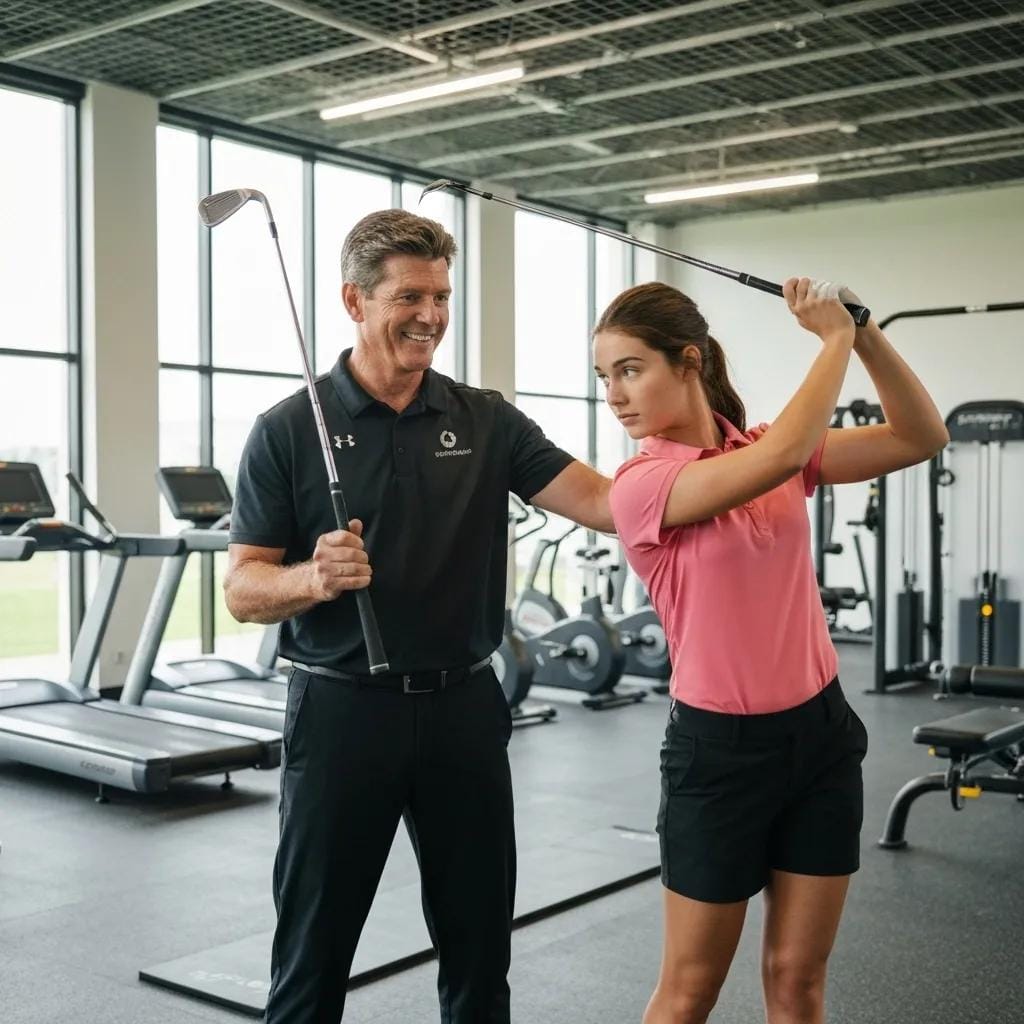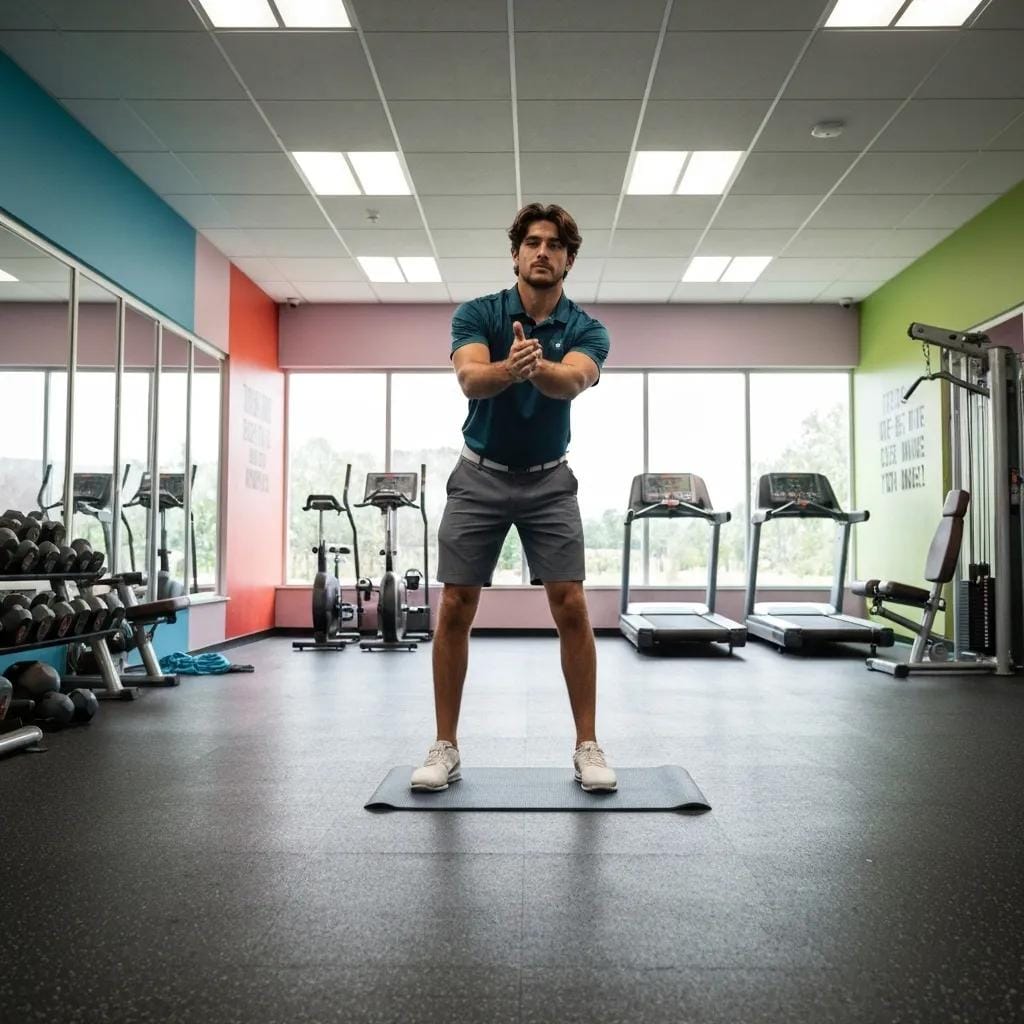
TPI Golf Performance Evaluation for Optimal Swing Analysis: Improve Your Game and Prevent Injuries
Golfers face hidden physical limitations that directly affect swing mechanics and lead to common injuries. A TPI Golf Performance Evaluation integrates a 16‐point movement screen, video swing analysis, and personalized corrective strategies to unlock optimal biomechanics and enhance clubhead speed. In this guide, you will discover how the TPI assessment works, explore its core components, understand the benefits for players at every level, learn what to expect during screening, review corrective exercise protocols, identify who gains the most, examine cost and booking details, and meet the certified professionals at rhw-indy.com.
What Is a TPI Golf Performance Evaluation and How Does It Work?
A TPI Golf Performance Evaluation is a comprehensive assessment that analyzes how a golfer’s physical capabilities influence their swing mechanics to optimize performance and reduce injury risk. This process combines a structured movement screening, detailed swing analysis, and a tailored fitness plan to address individual limitations and improve the body-swing connection.
What Are the Key Components of a TPI Golf Assessment?

Before the physical screen begins, every golfer receives a video tutorial explaining movement tests and swing metrics.
- Movement Screening evaluates mobility, stability, strength, and balance through 16 standardized tests.
- Swing Analysis uses high-speed video capture to correlate body positions with swing faults.
- Personalized Plan prescribes corrective exercises, flexibility drills, and fitness protocols tailored to each golfer’s deficits.
These elements form a cohesive strategy that links physical function with on-course performance and lays the groundwork for targeted improvement.
How Does the TPI Physical Screening Identify Swing Limitations?
The TPI movement screen pinpoints restricted joints and muscle imbalances by assessing each body segment’s range of motion and neuromuscular control. It reveals limitations such as:
- Thoracic Rotation Deficit causing poor posture at address.
- Hip Mobility Restriction leading to early extension.
- Core Stability Weakness producing loss of sequence.
By mapping these deficits, the evaluation defines clear intervention points and prevents swing faults from recurring.
Correlation of Titleist Performance Institute (TPI) Level 1 Movement Screens and Golf Swing Faults
This study investigated the relationship between TPI Level 1 movement screen variables and 14 common golf swing faults in 36 male and female golfers. It found significant associations between certain physical limitations, such as toe touch and bridge tests, and swing faults like early hip extension and loss of posture.
This research directly supports the article’s claim that TPI movement screens can identify specific physical limitations that correlate with common golf swing faults, guiding targeted interventions.
What Role Does the Body-Swing Connection Play in Golf Performance?
The body-swing connection describes how physical attributes—mobility, stability, coordination—drive each segment of the kinematic sequence for efficient energy transfer. When this connection is optimized, golfers experience enhanced consistency, greater distance, and reduced stress on joints. Understanding this relationship allows coaches to directly target the root causes of inefficiency rather than masking symptoms with swing adjustments.
What Are the Benefits of a TPI Golf Assessment for Golfers of All Levels?
A TPI Golf Assessment delivers measurable improvements in power, accuracy, and durability by harmonizing physical function with biomechanical demands.
- Improved clubhead speed and distance
- Enhanced swing consistency through balanced sequencing
- Reduced incidence of lower back, shoulder, and wrist injuries
- Increased on-course endurance and recovery
These outcomes translate into lower scores and a more enjoyable game.
How Does TPI Evaluation Improve Swing Efficiency and Power?
By identifying and addressing joint restrictions, the evaluation optimizes each link in the kinematic chain—from ground force generation through a stable core to precise arm release. This targeted approach improves energy transfer and increases clubhead speed by up to 10%, delivering longer drives without extra effort.
Associations Between Physical Characteristics and Golf Clubhead Speed: A Systematic Review with Meta-Analysis
This systematic review and meta-analysis of 20 studies found that various physical characteristics are associated with golf clubhead speed (CHS). Notably, jump impulse, upper body explosive strength, and lower body strength showed strong associations with increased CHS, while general flexibility did not significantly correlate with speed.
This meta-analysis provides evidence for the article’s assertion that improving physical function, particularly explosive strength and power, can lead to enhanced clubhead speed and overall golf performance.
In What Ways Does TPI Help Prevent Common Golf Injuries?
TPI screening highlights risk factors such as poor hip rotation or inadequate scapular control that contribute to injury. Corrective strategies strengthen supporting muscle groups and restore balanced movement patterns, reducing stress on vulnerable areas and lowering injury rates—especially in the lower back, elbows, and shoulders.
Why Is a Personalized Golf Fitness Plan Important After Evaluation?
A one-size-fits-all regimen overlooks unique deficits identified in the movement screen. A personalized plan ensures each golfer addresses precisely their limitations—whether targeted hip-opening drills, thoracic mobility routines, or core stabilization exercises—maximizing results and preventing re-injury through purposeful, progressive training.
What to Expect During the TPI Physical Screening Process?
Undergoing a TPI physical screening follows a structured workflow that ensures clarity, comfort, and comprehensive data capture.
How Is the 16-Point Movement Screen Conducted?
The movement screen spans four categories—mobility, stability, balance, and functional strength—through standardized tests such as:
- Seated Rotation measuring thoracic mobility.
- Single-Leg Balance evaluating ankle stability.
- Core Endurance testing trunk control.
Each test yields scores that map physical capabilities and highlight compensatory patterns.
What Types of Swing Faults Can TPI Identify?
TPI analysis links physical limitations to common swing faults, including:
- Early Extension caused by hip mobility deficits.
- Over-the-Top resulting from lack of scapular stability.
- Reverse Spine Angle due to poor core endurance.
This mapping clarifies whether a swing flaw is mechanical or physical in origin, guiding effective intervention.
How Do TPI Certified Professionals Conduct the Evaluation?
TPI certified professionals at rhw-indy.com—comprising physical therapists, chiropractors, and golf fitness trainers—hold TPI Level 1 and Medical certifications. They blend clinical expertise with golf-specific knowledge, using video capture, force plates, and real-time feedback to deliver precise assessments and actionable recommendations.
How Do TPI Corrective Exercises and Golf Fitness Programs Enhance Your Swing?
Implementing targeted corrective exercises and a structured golf fitness program translates physical improvements into on-course performance gains.
What Are the Most Effective Corrective Exercises for Golfers?

Before prescribing exercises, professionals analyze each golfer’s screening results to select drills such as: our specialties
| Exercise | Targeted Limitation | Outcome |
|---|---|---|
| Hip Flexor Release | Restricted hip extension | Increased turn and follow-through range |
| Plank Variations | Core stability deficits | Enhanced trunk control and sequencing |
| Thoracic Rotation Stretch | Limited upper back mobility | Improved shoulder turn and swing plane |
These exercises restore balanced movement, paving the way for efficient power generation.
How Does Golf Fitness Training Improve Mobility, Stability, and Strength?
A well-rounded fitness program combines dynamic warm-ups, resistance training, and mobility drills to build:
- Joint Mobility for unrestricted swings.
- Core and Hip Stability for consistent sequencing.
- Rotational Strength to generate controlled power.
This integrated approach enhances athleticism on and off the course, reducing fatigue and injury risk.
How Can TPI Programs Be Integrated with Rehabilitation Services?
When recovering from back pain, shoulder injuries, or post-surgery limitations, golfers benefit from combining TPI protocols with physical therapy. TPI screenings inform therapists of underlying swing-related deficits, enabling seamless integration of corrective drills and rehabilitation exercises that accelerate recovery and ensure a safe return to play.
Who Can Benefit from a TPI Golf Performance Evaluation?
Every golfer—from junior amateurs to seasoned seniors—gains actionable insights from a TPI evaluation, unlocking safer, more powerful swings.
Why Should Junior and Amateur Golfers Get a TPI Assessment?
Young players develop foundational movement patterns that carry through their careers. Early identification of asymmetries and mobility gaps ensures juniors build efficient swing mechanics, preventing bad habits and supporting long-term progression.
What Are the Benefits of TPI for Senior Golfers Over 40?
As golfers age, joint stiffness and muscle loss can degrade swing quality and increase injury risk. A TPI assessment for seniors focuses on preserving mobility, reinforcing stability, and adapting exercises to accommodate age-related changes—promoting longevity and enjoyment of the game.
How Does TPI Support Golfers Recovering from Injuries or Surgery?
Post-injury or post-operative golfers often face compensatory movement patterns that undermine performance. TPI evaluations pinpoint these adaptations and prescribe corrective exercises that integrate with existing rehabilitation plans to restore normal function and facilitate a secure, effective return to the course.
How Much Does a TPI Golf Performance Evaluation Cost and How Do You Book an Appointment?
Pricing for TPI evaluations varies by package, offering transparency and flexibility for every golfer.
What Are Typical Pricing Options and Packages for TPI Assessments?
- Standard Assessment: Single session including movement screen, swing analysis, and report.
- Performance Package: Assessment plus three follow-up sessions for exercise progression and video review.
- Complete Rehab Bundle: Combined TPI evaluation with physical therapy integrations over multiple visits.
Clear pricing ensures golfers can select the right level of support for their goals.
How Can Indianapolis Golfers Schedule Their TPI Evaluation at rhw-indy.com?
Booking is straightforward: visit rhw-indy.com, choose the TPI Golf Performance Evaluation service, select your preferred date and time, and complete the online intake form. A confirmation email with pre-screening guidelines will follow, preparing you for an efficient, informative session.
Are There Testimonials or Success Stories from Local Golfers?
Local golfers have reported average drive gains of 15 yards, significant pain reduction, and lower scores after TPI evaluations at rhw-indy.com. Success stories highlight juniors improving consistency, seniors regaining mobility, and post-surgery players returning stronger—demonstrating real-world impact.
Who Are the TPI Certified Professionals at rhw-indy.com and What Are Their Credentials?
Expert guidance drives every evaluation, delivered by a multidisciplinary team trained in golf biomechanics and clinical rehabilitation. our team
What Qualifications Do Our TPI Certified Physical Therapists and Trainers Hold?
Our staff includes:
- Physical Therapists with Doctor of Physical Therapy degrees and TPI Medical certifications.
- Chiropractors holding TPI Level 2 credentials in golf performance.
- Golf Fitness Trainers certified in TPI Level 1 and advanced corrective exercise techniques.
These qualifications ensure authoritative assessments and safe progressions.
How Do Our Experts Use TPI Knowledge to Improve Your Golf Performance?
By leveraging TPI’s research-based protocols, our team interprets movement screen scores, identifies causal relationships between physical deficits and swing faults, and crafts targeted interventions that translate into measurable gains in clubhead speed, accuracy, and durability.
How Does Working with TPI Certified Professionals Enhance Your Results?
Partnering with certified experts ensures: our specialties
- Precision in identifying root causes of swing issues.
- Accountability through structured follow-up and progress tracking.
- Continuity as corrective exercises evolve with your game.
This collaborative approach accelerates improvement and fosters lasting, injury-resilient biomechanics.
Golfers who invest in a TPI evaluation at rhw-indy.com unlock a comprehensive path to improved performance, sustained fitness, and injury prevention. Book your session now to experience expert guidance, personalized plans, and measurable on-course gains.
Every swing begins with a solid foundation in physical function and biomechanical insight. By choosing a TPI Golf Performance Evaluation, you commit to mastering that foundation under the guidance of certified professionals. Your optimized swing awaits—schedule your evaluation today at rhw-indy.com.
Frequently Asked Questions
What should I wear for a TPI Golf Performance Evaluation?
For your TPI Golf Performance Evaluation, it’s best to wear comfortable athletic clothing that allows for a full range of motion. Consider wearing golf shoes or sneakers with good grip, as you may be required to perform various movement tests. Avoid heavy or restrictive clothing that could hinder your mobility during the assessment. Additionally, wearing layers can be helpful, as you may experience different temperatures during the evaluation process.
How long does a TPI Golf Performance Evaluation take?
A typical TPI Golf Performance Evaluation lasts between 60 to 90 minutes. This timeframe includes the movement screening, swing analysis, and the development of a personalized fitness plan. The duration may vary based on the specific package you choose and the complexity of your individual needs. It’s essential to allocate enough time to ensure a thorough assessment and to address any questions you may have with the certified professionals.
Can I undergo a TPI evaluation if I have a pre-existing injury?
Yes, you can still undergo a TPI evaluation even if you have a pre-existing injury. The assessment is designed to identify physical limitations and movement patterns that may be contributing to your injury. TPI certified professionals will tailor the evaluation to accommodate your condition, ensuring that the process is safe and effective. They can also integrate corrective exercises that align with your rehabilitation needs, promoting a safe return to golf.
How often should I repeat the TPI evaluation?
It is generally recommended to repeat a TPI Golf Performance Evaluation every 6 to 12 months, depending on your progress and any changes in your physical condition. Regular evaluations help track improvements, adjust your personalized fitness plan, and address any new limitations that may arise. Frequent assessments ensure that your training remains aligned with your evolving golf performance goals and physical capabilities.
Are TPI evaluations suitable for non-golfers?
While TPI evaluations are specifically designed for golfers, the principles of movement screening and corrective exercise can benefit non-golfers as well. Individuals looking to improve their overall fitness, mobility, and injury prevention can gain valuable insights from the assessment. The personalized fitness plans developed during the evaluation can be adapted to various sports or general fitness goals, making it a versatile option for anyone interested in enhancing their physical performance.
What follow-up support is available after the evaluation?
After your TPI Golf Performance Evaluation, you will receive a personalized fitness plan that includes corrective exercises and mobility drills tailored to your specific needs. Many TPI certified professionals offer follow-up sessions to monitor your progress, adjust your plan, and provide ongoing support. This may include additional assessments, video reviews of your swing, and guidance on implementing the exercises effectively to ensure you achieve your performance goals.

